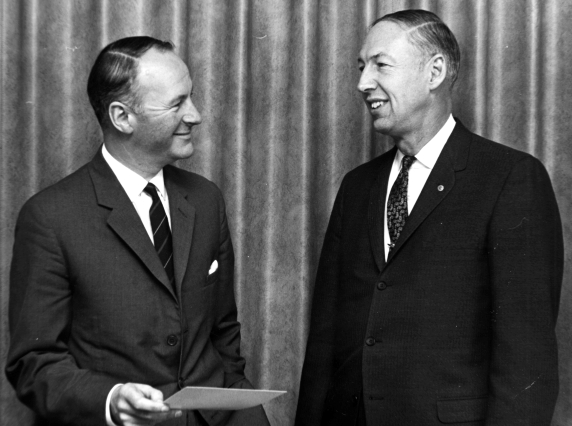 |
| John Stott with Hudson T. Armerding, circa 1968 |
Word spread today that John Stott has left this earth and moved on to his reward following a short illness. Stott, who died mid-afternoon London-time, had a relationship with Wheaton College that went back many decades. He spoke at Wheaton on numerous occasions with nearly thirty recordings being housed in the College’s archive. Stott, who studied at Cambridge University and was the long-time minister at All Soul’s Place, Langham Place (Adjacent to the BBC), was a frequent-enough speaker at Wheaton College that a pattern for his visit emerged where he would have a time of questions and answers with students following his address. During his 2003 visit to Wheaton, responding to a student’s question of how to proclaim Christ in a post-modern, relativistic age, Stott responded, “I, myself, am persuaded that the major way in which the gospel can be presented to a post-modern age is not by anything we say but how we live. There needs to be in us Christian people an authenticity which cannot be denied, so there is no dichotomy between what we say and what we are. No dichotomy between our public life and our private life. What an incredible thing it is in our day that politician after politician after politician says “My private life has nothing to do with my public life.” What unadulterated rubbish that is. So, there must be no dichotomy between what we are in private and in public. What we say. What we are. That is authenticity. People have to see Christ in us and not just hear what we talk about.”
Stott was a strong proponent of the expository form of preaching, which seeks to shine light upon the meaning of a particular text or passage. Former Wheaton faculty member Kenneth Kantzer wrote in Christianity Today‘s pages in 1981, “When I hear him expound a text, invariably I exclaim to myself, ‘That’s exactly what it means! Why didn’t I see it before?'”
According to a Christianity Today write-up, Stott was born into a London doctor’s family where he spent virtually his entire life in the same London neighborhood. He would later become the pastor of the church he attended as a child, All Souls Church, though he was less interested in the service then than later. He would sometimes drop wads of paper from the balcony on to the hats of ladies below. When Stott was ordained Evangelicals were in the minority in the Church of England, without a single Evangelical bishop. He fostered the growth of Evangelical organizations, such as the National Evangelical Anglican Congress, within and outside of the church, proper. His biggest contribution to the church as a whole was his participation in the Lausanne Congress on World Evangelization and its subsequent work. He gave the opening address and was the chair of the committee that drafted the Lausanne Convenant, which established a common mission for evangelical action. Lausanne was a defining moment in global evangelicalism. The records of the Lausanne meetings are located in the Billy Graham Center Archives. Stott was a concerned about global Christianity and his engagement was diplomatic and humble. When Stott traveled to Argentina to meet with Latin American theologian Rene Padilla the two found themselves in the middle of a heavy rain storm. They arrived to their destination completely drenched and muddied. Padilla remembered vividly the grace shown by Stott as he took the time to clean and shine Padilla’s shoes.
Along with the archival audio at Wheaton College several of Stott’s more recent addresses are available online through Wheaton’s WETN website